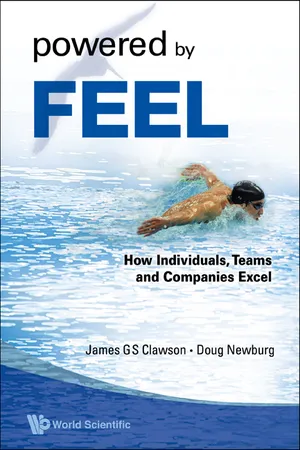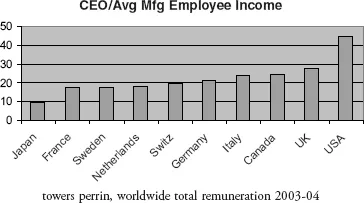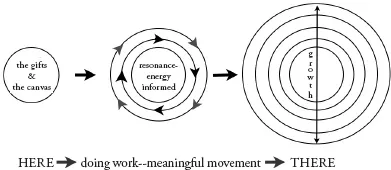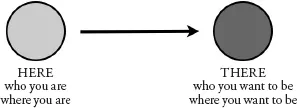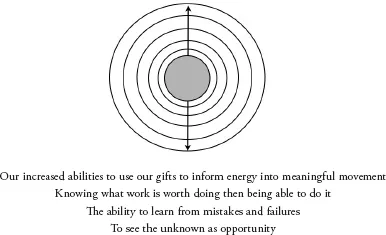![]()
PERSONAL
APPLICATIONS
![]()
FRANK DEFORD, SPORTS ILLUSTRATED
S
HE SIMPLY LOVES PLAYING. T
ENNIS IS A JOY TO HER. T
HAT'S ALL.…N
O, SHE DID NOT NEED TO ALMOST BE KILLED, SHE DID NOT NEED TO LOSE HER GREATNESS TO A MADMAN'S KNIFE, TO BECOME THE FULL, FINE PERSON THAT SHE IS. B
UT WE CAN SAY THAT 10 YEARS REMOVED FROM HELL, M
ONICA S
ELES HAS WON WITH A GOOD, BRAVE HEART FAR MORE THAN SHE EVER DID WITH A TENNIS RACKET. I
N HER OWN SIMPLE WORDS OF PRAISE, SHE'S A HUMAN BEING.PAYBACK
An international association once asked me to be a plenary speaker after lunch. I didn't know the group well so I was not finalizing my thoughts until the last minute. I'd gone to the conference early to scope out the audience. They were a formal group. There were lots of suits, white shirts, and ties. Very polished, shiny shoes. Like Doug, I knew what to do, how to do it, and usually it felt really good. I'd prepared two options, one more academic and one more impactful but a bit of a stretch from the requested title. I'm warming up to the experience looming.
As we readied all of the AV stuff during lunch, to my complete surprise, they took control of my slides in the back of the room.
That one thing, like Coach Valvano's overheard comment, really threw me for a loop. I no longer had control over what I would do at tip off.
The people in the back were in charge.
When it came my turn, with a 1,000 people in the audience, I stood up and…froze.
The people in the back showed my first slide for presentation number one.
I knew that I should do presentation number two, but it was too late. The die was cast.
I was unable to change mid-stream, even though I realized, constantly, continuously, that what I was doing was not what the group wanted or needed.
There was me inside shouting, “Don't do this! Do the other thing!”
But I couldn't.
It was like being on a large karaoke stage and suddenly they put up a song you don't know. You could hear the groans.
I could feel the pain. It was a disaster.
What's worse, the next speaker was spectacular! She was engaging, poised, and had good content. By comparison, I was a stuffed bear with the mange and nowhere to hide.
My payback came in a different place and time — much later. I was invited again, to my surprise, to be plenary speaker, not to that same group, but to a different group, a group I knew much better.
But still the issue is, “What does one say that will grasp the minds and hearts of a large audience?” In this case, as well, there was a significant intimidation factor. I hadn't been with the group for some time, and the previous plenary speaker the day before was one of the bright luminaries in that field.
Jeez, I'm thinking, how can I follow that?
This time though (and every time since that time mentioned above) I was in control of my slides. I could manage the pace and the topic and give my repertoire on my computer. If I wanted to I could change gears. I could look left, look right, and if all the receivers were covered, I had options.
I did my thing my way. It was more of a conversation really. It felt good to me, and I was enjoying the “relationship in the air” between me and the audience. The sequencing felt right, the words somehow emerged. The timing was good.
When it was over, shock, there was a standing ovation. The president of the organization said she'd never seen that before. I felt that warm afterglow when you realize that you played well, fit the pace of the game, and it was good for all. Not a prideful thing, a realization really that the thing itself, playing the game, was its own reward.
Most of the conversations I hear among MBAs, practicing managers and executives about reward compensation include discussions about how to incentivize people. Everyone wants to know, “What's the incentive? Why should anyone want to do this?” Always the discussion is about pay, recognition, medals, bonuses, time off, raises, perquisites and benefits.
The good folks at Towers Perrin have been tracking executive compensation for some time now. Data stretching over the last almost twenty years have stayed pretty much the same relatively. Consider for example, the ratio between CEO income and the average manufacturing employee's income. Figure 23.1 shows that ratio for several countries. The ratio in the US is nearly twice what it is in most industrialized countries. The difference has grown over the last 15 years.
Figure 23.1. Executive pay multiples
“Well, that's fine,” you say. “The CEO to front line employee income ratio is an indication of the entrepreneurial spirit and of the power of the free market.”
Perhaps.
These data also suggest growing gaps between the have's and the have-not's. The problem with that is that eventually as history shows the have-not's rebel and tear the system down. I saw in the news recently that the richest man in India is building a new house for him and his family — a 23-story skyscraper complete with six floors of parking, gyms, pools, theaters, etc. Wow. I wonder how he incentivizes his employees?
The problem with incentives has been aptly described by Alfie Kohn in a wonderful book, Punished by Rewards.1 He says that the problem is that all external incentives to do work systematically de-motivate people to work.
That statement is counter-intuitive for most managers.
Consider this simple experiment. If you select people randomly, then randomly divide them into two groups, and ask them to play a board game like Monopoly® for two hours explaining that you're going to give them a break after one hour, and then video tape what they do, you find that the group you offered to pay left early for the break, came back late and wanted to leave early.
The group that you didn't pay, played through the break, and stayed late. These results emerge not just once, but over and over again. It's clear that when you pay people to do a thing, their energy for doing it declines.
Golfer Tom Weiskopf once commented that he remembered exactly the day that he stopped enjoying golf — he said it was the day he turned pro.
Contrast that with a well-known musician Doug described earlier who declares that people pay him a lot of money to stay away from his family, to eat rubber chicken, to stay in lousy hotels, and travel in buses. But, he says, when he goes on stage and the curtain goes up and the camera lights go on, that he does for free.
Kohn describes the effect of external rewards in this way:
“The more significant problem is precisely that the effects of rewards do last, but these effects are the opposite of what we were hoping to produce. What rewards do, and what they do with devastating effectiveness, is smother people's enthusiasm for activities they might otherwise enjoy.” 2
The challenge with incentives and external rewards is that people sense deep down that if you have to pay me to do this job, it must not be worth doing on its own. We see this in the graduate schools of business. MBAs who want to go to Wall Street and make their fortunes. Some of them love making deals; many of them just want to get rich quick and leave. Most of them leave before they get rich and land back in the alumni career services office looking for help in finding something else. This is another manifestation of the “energy sustainment” problem we talked about earlier.
So how you compensate people is a big deal.
Most of the world focuses on the external measures like money, recognition, title, perquisites, benefits, and company cars or planes.
But is that why people really work? To pay the bills? Surely. That's good enough for large numbers of people. But working for money is a formula for mediocrity. If you want to consider world-class performance, though, you'll have to look deeper.
How would you plan to compensate someone if you wanted them to compete at the world class level?
1 Alfie Kohn, Punished by Rewards: The Trouble with Gold Stars, Incentive Plans, A's, Praise, and Other Bribes, Mariner, NY, 1999.
2 Ibid, page 74.
![]()
CHARLES SCHULZ
I
JUST HAVE TO DRAW FROM M
ONDAY TO T
UESDAY TO W
EDNESDAY TO T
HURSDAY AND IT GOES ON AND ON AND ON. P
EOPLE SAY “W
HY CAN'T YOU WORK REAL HARD, GET WAY AHEAD AND THEN YOU COULD TAKE A MONTH OFF.” T
HAT'S FOOLISH. M
INE IS NOT THE KIND OF A JOB I
'VE WORKED ALL MY LIFE SO THAT I
DON'T HAVE TO DO IT.WORK
Despite its title, this chapter is about compensation. It is where all the pieces come together — the individual, organizational, and the overlap. It is also about work and I mean that in the most exciting manner.
Work can be described simply as meaningful movement, from where you are to where you'd like to be. Power is the benefit/cost ratio of the work you do.
Wellth (a clever term I've used for over a decade) is the result of your work and is the sum of meaningful movement and growth in your ability to do work.
This has everything to do with compensation. You could even say these ideas define compensation.
What I learned from world-class performers was that they defined their own form of pay, and it was, believe it or not, all related to their ability to do work powerfully in the direction of wellth.
They wanted to move from where they were to where they wanted to go in their lives as powerfully as possible and in a way that increased their ability to move powerfully with meaning.
The clearest example I can give you goes back to the Grammy award-winning musician. He loved playing and making music. Therefore, he decided the best way to do that as often as possible was to get good enough as a musician to make a living at it. He also knew that to be a great musician might mean working with other artists for free or doing gigs for less money or working more days than he might want to.
In each case, the form of compensation might be different. One time it might be money, another time meeting new people, learning or increasing his skills in front of an audience. These all helped him move and grow in the direction he wanted life to take him. His compensation is not simply an exchange or payment. His compensation is actually the doing of work in his own life. As he does this work, he can measure it in terms of wellth (see Figure 24.1) — the skills he acquires and improves, financial fitness, and health, the things he needs to do the work of his life powerfully.
This goes for organizations, too. If you look at a company you might invest in, you want to know not just that it increases its wealth, but that in doing so it is increasing its ability to grow, to sustain a certain level of performance so it can compete in the future.
Figure 24.1. Work done + growth = wellth
Well, what is a bigger investment than your skills and your time? Why wouldn't you think this way about the place you seek employment? Furthermore, why wouldn't everything you do be measured in this way? Relationships? Vacations? Purchases?
World-class performers recognize that everything they do is designed to move them from where they are to where they want to be (see Figure 24.2). The compensation they seek is no exception. If it does not help them do work, if it does not increase their ability to meaningfully move, they don't need it and they don't waste their time pursuing it.
Figure 24.2. Work is meaningful movement
Consider this from the former International Chairman of Goldman Sachs:
“Title is incidental. Who cares about the title? That's not what you hear out of most corporations. I had a waiting period before I got into grad school. I worked as a management trainee. I went through a lot of departments. When I got to compensation and the personnel department, I spent several weeks. I got to study the compensation of people. I had access to info that most people did not have.
So here's three or four people at the very top making a lot of money. A sea of people who might have worked there for years who were hardly making anything. That was my first education as to what the real world was like in a big company. Damned if I want to do that. The odds of making it into that rarified atmosphere was pretty small.
That's one of the things that has gotten way out of whack in this country. Couple of guys making a hundred million dollars and everybody else swimming around down here with nothing. There has to be a lot of thought to the meritocratic work conditions, the way you evaluate people, the way you bring them along, the way you incent them to do things, and the tangible evidence that you indeed have their interest at heart and to pay them accordingly. I like all of that stuff. I enjoyed it. I liked the diversity of what we did. It was a lot of fun. And I made a ton of mistakes.”
In this case, wellth is the combination of getting to do the work, the education, and the financial remuneration among other things. Most people do not look at compensation this way, nor do most companies. Instead, they seem stuck on the treadmill like TV cartoon character George Jetson yelling, “Jane, get me off this crazy thing.”
We have a plethora of self-help and management books out there. Gurus and consultants. Seminars and classes and degrees. I've read, taken, attended, even taught these too. Yet it seems far too many of us still see work and compensation as an exchange of time, effort, and skill for money, and we do not really put the money to work for us, but to escape into consumerism.
This is not the doing of work, rather just working. No meaningful movement, no growth, no power, no wellth.
I watch while people collect that money and use it to undo the damage they do to their own lives by the careers or jobs they have chosen. You cannot do work powerfully if you have no idea where you are or some idea of where you want to go. Maybe you simply want to go for the ride and see where that takes you. But it helps to know where you are in life relative to where you might like to go.
You cannot define compensation powerfully if you do not know where you want to go or consider the different ways and means there are to get there.
You cannot do work powerfully if you do not grow in the process of doing work. (See Figure 24.3.) You might move from here to somewhere, but you will not be prepared for any change in course. Compensation is not the exchange of one thing for another, of time and effort for money.
Figure 24.3. ...
